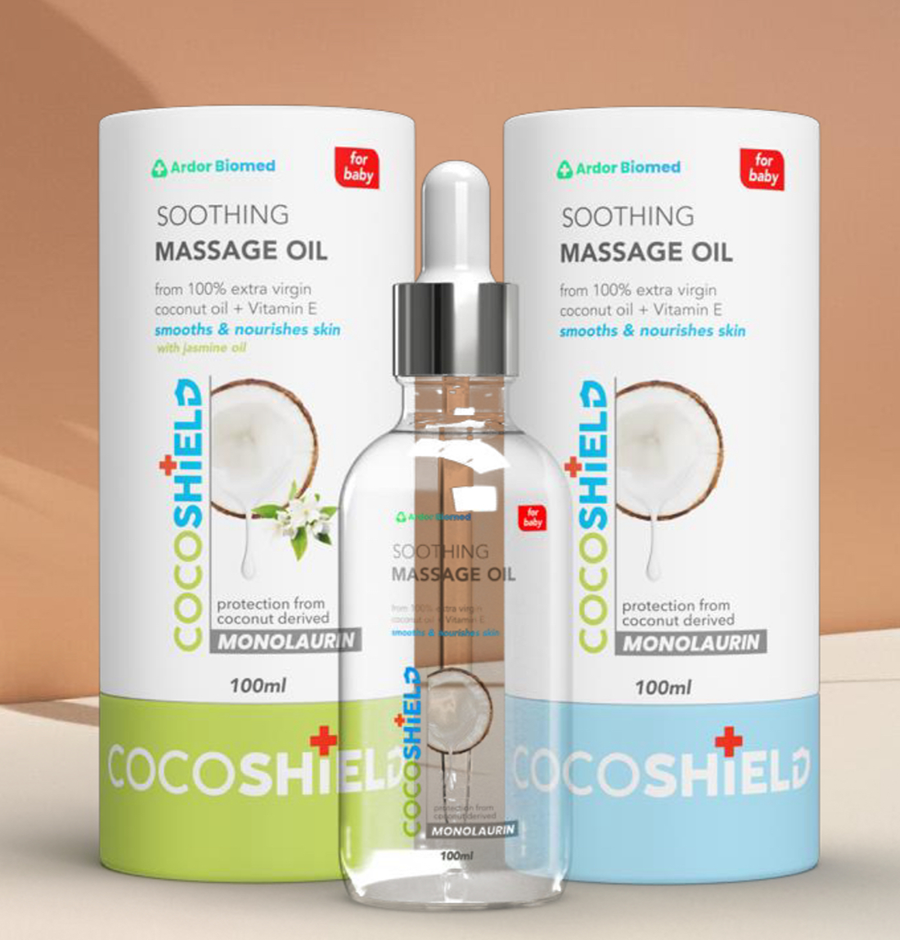You’ve heard the phrase: trust your gut. How are you going to trust it when you don’t take care of it? More often than not, people tend to ignore their gut health. Abha Appasamy strives to help people take charge of their health and make a positive change.
How care turned into a passion
Abha introduces herself as a caretaker. All her life, she has taken care of others—a special child, her elderly parents, a diabetic cat, and her husband through many health crises. She started her business following her husband’s diagnosis of potentially chronic stomach and gut issues in 2017. The doctor described it as a fire spreading through a forest, leaving devastation everywhere; it would take a long time to fix. She scoured the internet for the most powerful probiotic food and found milk kefir. Sourcing 1 teaspoon of starter from somewhere deep in the south cost her 2000 rupees, but Kefir did wonders for her husband’s gut and Abha’s traumatic arthritis, a result of a major accident in 1999. Her tooth sensitivity went away, and she didn’t have to rely on daily painkillers for her knees. It was clear to her: probiotics were healing. The question was, where would she start?
 Abha Appasamy, the founder of Abha’s Probiotics, speaking about her entrepreneurial journey
Abha Appasamy, the founder of Abha’s Probiotics, speaking about her entrepreneurial journey
A forgotten memory
“A long time ago, someone gave my mother a kombucha culture. It wasn’t called kombucha then; they called it ‘Manchurian mushroom tea’. She experimented by fermenting it overnight in sweet tea and found that it helped settle her stomach. When we bought our first computer, I did my own research and figured out a more viable method of making kombucha. Unfortunately, while travelling, these live cultures perished, and I eventually forgot about them. 17 years later, while thinking of what else to make for my husband, I remembered kombucha. I also made beet kvass, which didn’t need a special culture; it was fermented with the natural bacteria in the beetroot itself. I had three products ready: how exciting! I didn’t know what, but I wanted to do something with my products.” What began as an act of care turned into a powerful purpose.
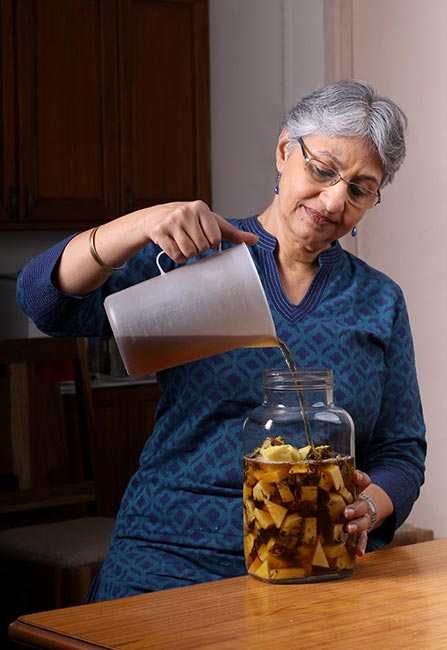
A journey of healing
Following her husband’s bout with illness and the loss of his job, Abha wanted to shoulder some of the family’s financial responsibility. “I was already 60 by then, and I didn’t have the energy or health to do a 9-5 job. I wrote for a while, but quickly realised what isolation could do to a person. I wanted to meet and interact with people. I turned to Facebook and began posting about my products. Most people didn’t know anything about probiotics, so I also posted informative articles. Then, people wanted to know where they could buy these drinks. I couldn’t believe it! Through word of mouth, my customer base grew, allowing me to increase my production from one jar to around 8 litres. I began experimenting with more probiotic drinks like ginger ale and pineapple tepache and expanded my range.” Feedback from friends, family, and strangers reinforced her confidence.
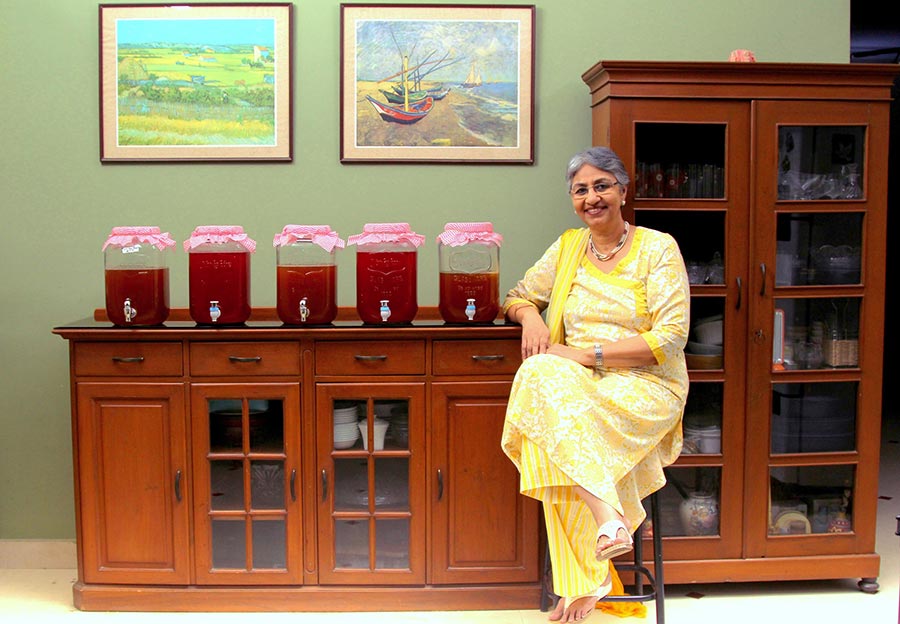 Abha with her set up of kombucha dispensers
Abha with her set up of kombucha dispensers
Stories that fermented belief
She narrates customer stories that cemented her belief in the products and their benefits. A friend with stage 4 cancer visited with his family. She served them her homemade ginger ale. They loved it, so she sent them home with more. He called her a week later and said her drink was a miracle—he hadn’t burped once. He had gone through 15 or 16 chemotherapy and radiation sessions; his gut had finally settled after her probiotic drink. Another cancer patient had gotten rid of most of her nausea following treatment. One customer shocked Abha by telling her that the ginger ale had worked as a mood stabiliser during peak traffic hours! This made Abha try more products: sauerkraut, kimchi, hummus, and beetroot kanji. Word spread, and her products hit the shelves.
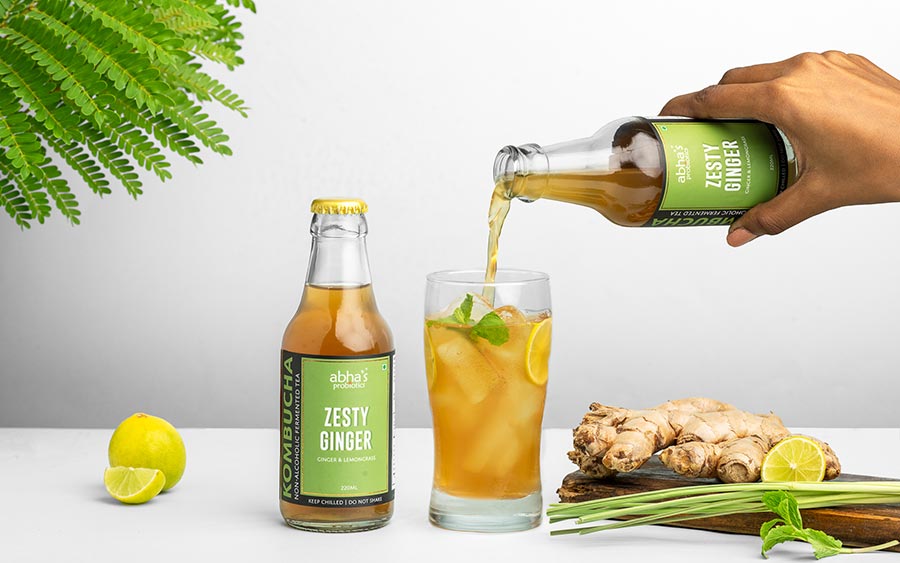 Ginger and lemongrass Kombucha
Ginger and lemongrass Kombucha
How sales took off
Following a 2018 interview with a journalist, a store called Gormei Market in Chennai wanted to stock Abha’s Probiotics. “This is my proudest moment to date. Within months of setting up my Facebook page, my products were available to purchase in physical stores! Another unbelievable moment was when one of my competitors stopped making his kombucha and started recommending mine to anyone who asked. This gave me the push to keep going; I was clearly doing something right.” With growth came the inevitable hurdles of business.
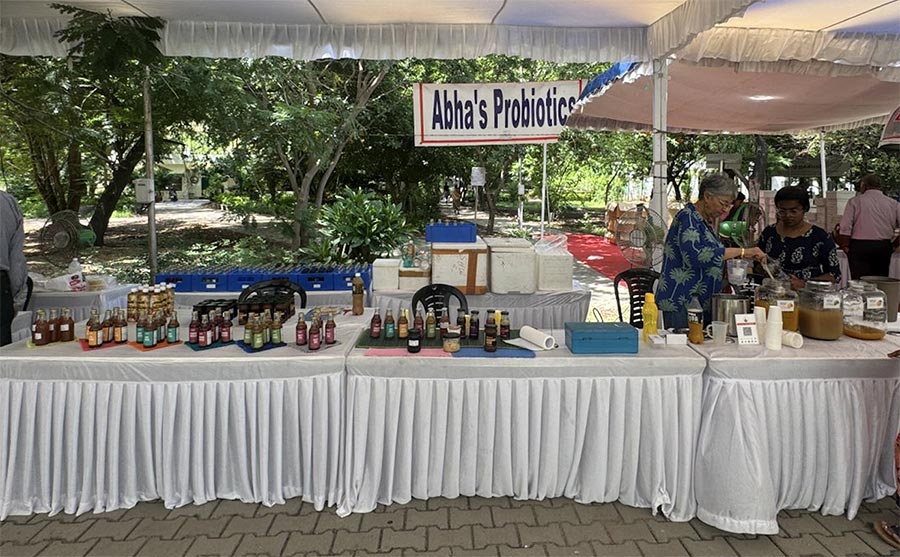 Abha’s Probiotics pop-up at the Kirk
Abha’s Probiotics pop-up at the Kirk
Learning curves
On the topic of challenges, she explains how keeping accounts was the hardest part for her. “I would get excited about the prospects of going retail, and not be careful with the bills and payments. I had zero business background; I had to figure everything out from scratch: the products, the business model, the profit margins, inventory, the packaging and shipping, everything. I experimented with some flavours that didn’t do well, so I scrapped those. It’s truly a learning curve every single day. I started doing things by instinct, and it somehow worked out,” Abha laughs.
Achieving market fit was not an easy journey, she explains. “I realised that there was a need in the market, but making the product was risky. It took time, it was expensive, and it was an artisanal experience. I put in a lot of effort to formulate a kombucha that was inherently mine. I attended a Global Kombucha Summit online during COVID, and found that the way I made my flavours was entirely different from what everybody else was doing. I tried their way, but my kombucha just did not taste as good. I knew then that there wasn’t one tried-and-tested formula. I went back to doing it my way because I know my unique way works. It took me over a year to perfect it. Every stage felt perfect, until the next time was better,” she smiles. As things settled, there came a trying situation.
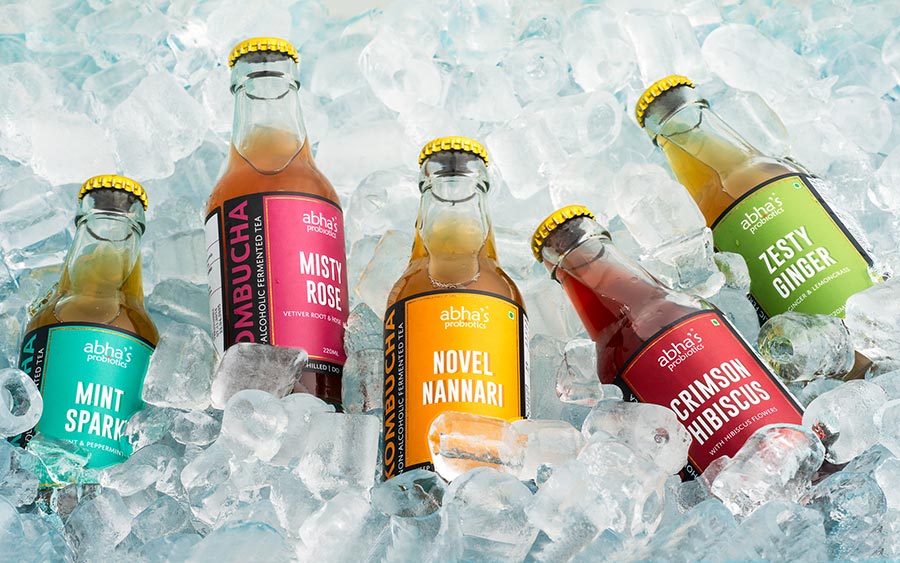 Abha’s Probiotics’ innovative Kombucha flavours- Spearmint and Peppermint, Rose and Vetiver, Nannari, Hibiscus, and Ginger and Lemongrass
Abha’s Probiotics’ innovative Kombucha flavours- Spearmint and Peppermint, Rose and Vetiver, Nannari, Hibiscus, and Ginger and Lemongrass
Trouble brewed
Everything was going great until one day, the kombucha began acting up. It was fermenting too fast, and it turned sour. Abha went from store to store, calling back the batches she had given them. Some stores gave them back, some kept them, saying the customers had zero complaints. After weeks of trial and error, she realised it was a problem with the starter. Restarting production would take months, and she had already incurred incredible losses. She was forced to take a break, and in that time, competitors with lower prices had made their way to fill the gap. It took time, but she got back to work.
The market has evolved today, she says. More people know about probiotics, and doctors are prescribing them as well. A lot of people have gut issues, but they don’t bother. Abha aims to improve people’s health naturally with no disruptive, artificial preservatives. Setbacks gradually turned into hope.
Preserving the essence and passing the baton
When it comes to the company’s future, she found doing it alone was very tough. “I’m 68 now. I don’t plan to work this hard for the rest of my life. I had actually planned to shut down on March 31st this year, but I guess God had other plans. Unexpectedly, at the last minute, someone who also wanted to start a Kombucha business, but whose partner changed his mind and left, approached me and asked to join me, so we could build the business together. I made a post on March 29th that I was not shutting down and that people could stop sending me condolence messages,” she laughs. “Fast forward to now, and here we are. Mathesh is full of energy, and he’s great at areas where I’m weak. It’s a good balance. We are now working on expanding our product range, formalising recipes and creating SOPs, so the business can be effectively scaled. Things are looking up! Eventually, of course, I want to exit and relax a bit, but for now I’m fully committed to building my business to the next level.”
Being a leader and running a business are not easy tasks. “If I had to give someone advice, I’d say, first, don’t try to do everything yourself. Build a capable team. Second, if it’s not profitable, it doesn’t make sense. Third, you have to be on top of quality control, always. Fourth, connect with your customers. Lose touch and you lose business. Finally, be authentic and trustworthy. If I had the chance to start over again, I would do all of these right from the beginning. I would also choose a product that wasn’t so unpredictable,” she chuckles.
“My products are helping people, which was my original intention for Abha’s Probiotics. I’ve always felt that life is worthwhile only if you make a positive impact. I am my authentic self, and people appreciate that. You don’t need to put on a show or have a fancy workspace; authenticity is key to building trust. I’m happy, because as long as I get to do this, I know I’m helping people, healing one gut at a time.” Arguably, that’s the essence of Abha’s journey—trusting her gut and helping people do the same.



